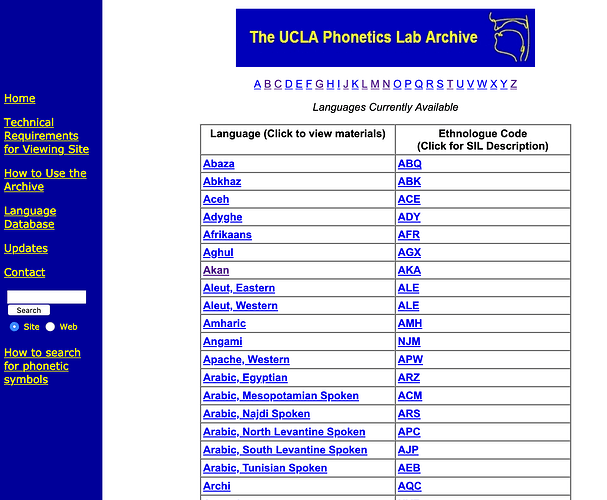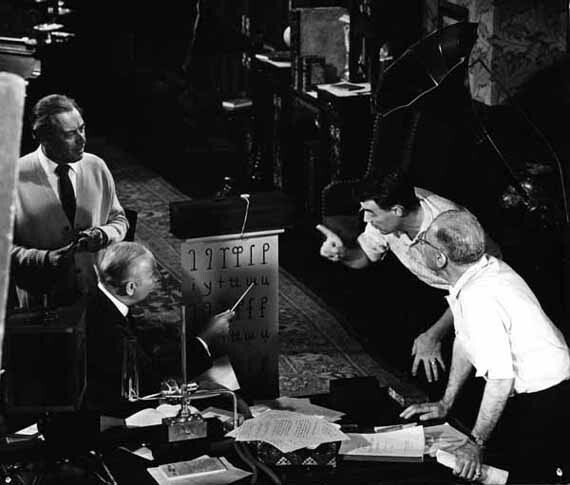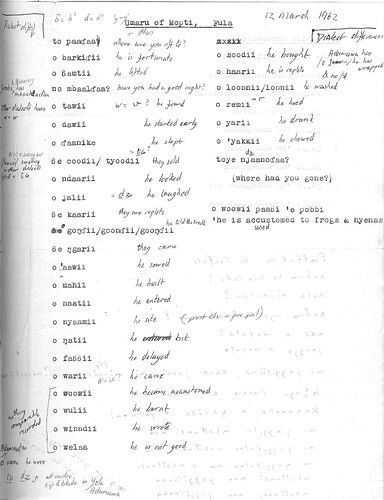I feel like this site is a gem of web documentation which doesn’t get quite enough attention:
http://archive.phonetics.ucla.edu/
There is a ton of stuff here. (See the whole list of languages — 315!!) UCLA has a long tradition of research in phonetics and phonology, and this site is a lovely archive of that.
An aside about UCLA phonetics
I can’t resist sticking in a few photos of the founder the lab, the late Peter Ladefoged, who surfed to a ripe old age:
Here he is as a phonetics consultant on the set of My Fair Lady:
A fairly unusual aspect of this archive is that the whole thing is under a Creative Commons license, specifically this one:
https://creativecommons.org/licenses/by-nc/2.0/
This means that as long as you’re not making money off the archive, you can create — indeed, you are encouraged to create — derivative works.
Reusing digital documentation
Once data is digital, assuming reuse is permitted, it becomes raw material. It can be reshaped, repurposed, recombined, re-lots-of-other-things.
Given its size, it is not surprising that certain language families show up more than once in this archive. One that caught my attention was the Fula or Fulani family, of which there are 5 representatives:
Fulani is a fairly major language and I’m sure there are other documentary resources out there somewhere, but even so, it’s not hard to imagine some comparative work with this content.
It would be fun to try doing something like that down the road, but for now let’s just take a tour of what is available for a given language here.
The specifics vary from language to language, but in general the types of data archived include:
Audio file:
At least some metadata:
Metadata
| Recording | 1 |
|---|---|
| Filename (WAV) | fuv_word-list_1962_01.wav |
| Filename (MP3) | fuv_word-list_1962_01.mp3 |
| Language: | Fulfulde (Nigerian) |
| SIL Code | FUV |
| Recording Contents | Word List |
| Recording Location | Unknown; speaker is from Gombe, Bauchi Province, Nigeria |
| Recording Date | 26 February, 1962 |
| Fieldworkers | Peter Ladefoged |
| Speakers | Y. Abubakar |
| WAV Digitization Quality | 44.1 K, 16-bit sound depth (bit rate=705 kbps) |
| MP3 Bit Rate | 56 kpbs |
| Original Recording Medium | reel tape |
| Unicode Word List | fuv_word-list_1962_01.html |
| Unicode Word List Entries | 1 - 28 |
| Tiff Image | fuv_word-list_1962_01.tif |
| Tiff Image 2 | fuv_word-list_1962_02.tif |
| JPG Image | fuv_word-list_1962_01.jpg |
| JPG Image 2 | fuv_word-list_1962_02.jpg |
| TIFF Image Quality | 300 dpi |
| JPG Quality | 300 dpi |
| Rights of Access | This work is licensed under a Creative Commons License. |
A scan of the original fieldnotes:
Which have since been input in a Unicode IPA transcript (nice!):
As you can see there are a few missing forms (although, listening to the recording, some of the missing forms were actually said).
Anyway, you get the idea. There is a ton here. It’s not hard to imagine derivative projects: what do you imagine?



